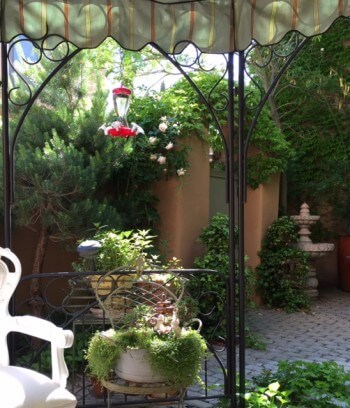
Victory Garden: A Place to Grow in Wisdom
“A garden is a grand teacher.” Gertrude Jekyll
For our April theme of Victory Garden, I would like to again share some of Gertrude Jekyll’s wisdom, and also give you a little peek at some behind-the-scenes workings at The St. James Tearoom meant as soil for growing in wisdom.
Gertrude Jekyll, as most of you know, is one of our tearoom’s dearly loved British Greats. An artist and garden designer in the late 1800’s, she changed the face of English gardens. She loved this gentle art and encouraged young and old to garden and to grow in the common sense and sagacity that gardening always brings. Gertrude stated, “A garden is a grand teacher. It teaches patience and careful watchfulness; it teaches industry and thrift; above all it teaches entire trust.” She wrote fifteen books, one of these for children, which I have just read. Her great love of gardens and growing things must have truly been a ‘grand teacher’, for her gentle wisdom is very evident.
Here are two examples of her wisdom from Children and Gardens:
1. “Someday you will grow up, and perhaps have big gardens of your own, and if you have learnt to know a lot about it when you were little, it will make you fit to take charge and to say how things are to be done, and to make the garden a glory and delight to yourselves and everybody else.” She gives her young readers the far-off vision of “being fit to take charge and to say how things are to be done” and of creating a garden that is “a glory and delight to yourselves and everybody else.” With such a grand and grown-up vision, the children have good reason to exercise diligence in learning all they can until then, and realize they must earn the right to take charge and say how things are to be done.
2. In describing the process of creating an intricate, complicated trophy for their May-day parade that took many days and many little hands to create, she brightly encourages, “There was a lot of work in it, as you may imagine…. The whole thing was most amusing, but then it is always the greatest fun to invent and contrive and get over difficulties.” No whining over difficulties here – just delight in the intriguing process of overcoming them! How children in our day and age need to hear this wisdom, that it is delight and the greatest fun to invent and contrive and prevail over difficulties.
I love wisdom. I want to learn the deep things, those things that lead to gladness and benefit, and away from destruction and harm. I only have one life, and I don’t want to waste any of it! I want to get the most out of it myself, without doing injury to those around me. So, being a gardener, I am warmed by our dear Gertrude’s gentle wisdom, learnt in her garden, and shared in such a compelling and tender way.
…. Now for that peek, and how we try to apply wisdom at the tearoom. Everyday, we begin each shift with fifteen minutes together, discussing wisdom as it applies to us. We call this time our Cornerstone, the foundation of our time together, serving you, our guests. Here, I will let you listen in to one of our Cornerstones that goes right along with Gertrude’s wisdom to her young readers over a century ago. Today’s Cornerstone is about Diligence. Please join us!
Diligence vs. Indolence
Diligence is a fixed mentality, a long-term decision to overcome all difficulties and obstacles in the way of a worthy goal.
Indolence is a lackadaisical attitude, avoiding exertion; it is idle and passive, as opposed to the industrious and active Diligence. Indolence is an apathetic, could-care-less way of living that is easily overcome by difficulties.
* (Here we talk about some of the things in life that are worthy goals, which require Diligence, such as learning a skill, following through on a commitment, or pursuing a dream.)
* (We discuss some obstacles that might derail Diligence, such as pressures, the Tyranny of the Urgent, our desire for instant gratification, or a lack of counting the cost of our endeavor.)
Diligence is not just hard work, it is ‘heart work’ because one must be committed to its goal. We must prize and protect both the commitment to the goal and the goal itself if we are to finish and achieve what we set out to do.
Thomas Edison was asked, “What do you think is the first [requirement] for success?” This was his answer: “The ability to apply your physical and mental energies to one problem incessantly, without growing weary.”
So the question is: What do you mean to finish? What do you want to be successful in?
Edison also said, “Opportunity is missed by most people because it is dressed in overalls and looks like work.”
What opportunity are you hoping for?
What heights do we want to reach here at the tearoom?
What heights do you want to reach personally in your life?
Oswald Chambers said, “…all noble things are difficult,” but others say, “Instant gratification takes too long.” (Carrie Fisher)
The heights by great men reached and kept
Were not attained by sudden flight,
But they, while their companions slept,
Were toiling upward in the night.
Longfellow
“The honest man takes pains and then enjoys pleasures, the knave takes pleasure and then suffers pain.” Benjamin Franklin
——————-
So I hope you have enjoyed our little foray down the beautiful path of a Victory Garden, and have seen that gardens of all types lend themselves as ‘Grand Teachers’ for those who are willing to learn. Where growth is encouraged and protected, Victory is assured.
Yours for a return to Grace, Civility, Beauty, Gentility, and Excellence,
Mary Alice
P.S. What ways do you use to grow your children in Wisdom? Do you consider your home a Victory Garden, where wisdom and all lovely things are grown? I would love to hear your ideas.








